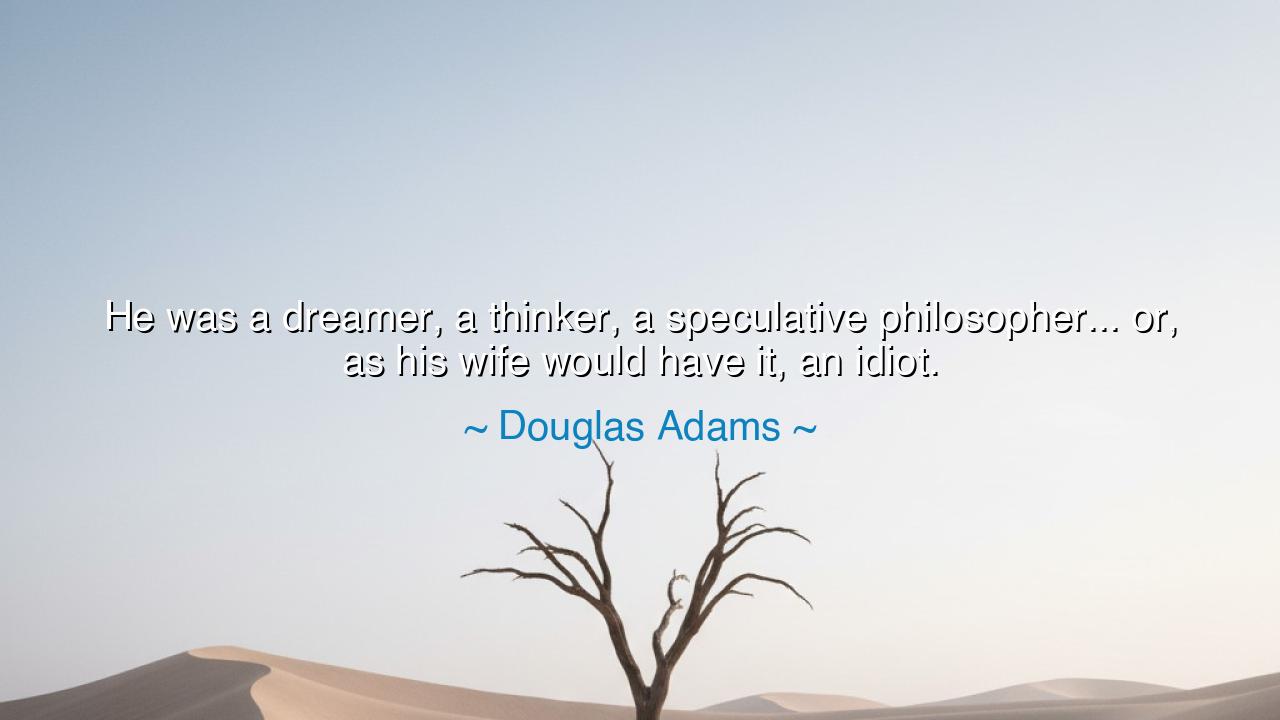
He was a dreamer, a thinker, a speculative philosopher... or, as
He was a dreamer, a thinker, a speculative philosopher... or, as his wife would have it, an idiot.






“He was a dreamer, a thinker, a speculative philosopher... or, as his wife would have it, an idiot.” Thus spoke Douglas Adams, the satirist of stars and absurdity, whose humor cloaked the wisdom of an ancient sage in the garments of laughter. Beneath this playful line lies a timeless meditation on the fragile balance between genius and folly, between vision and practicality, between the dreamer who sees what could be and the world that demands what is. Adams, in his way, reminds us that the boundaries of wisdom are not where most people think they are—for the very same act that one calls “vision” may look like “madness” to another.
This quote emerges from the mind that gave us The Hitchhiker’s Guide to the Galaxy, a universe where absurdity reveals truth and comedy becomes prophecy. Adams wrote not merely to amuse but to awaken—to remind humanity that what it calls “normal” is often the strangest thing of all. His dreamer, the so-called “idiot,” is the one who dares to think beyond the narrow corridors of convention. The dreamer questions, imagines, invents, while others cling to certainty. He explores the uncharted realms of thought, not for gain, but for the sheer wonder of understanding. Yet to those bound by routine and logic, such a spirit seems foolish, impractical, even insane. Thus, the world mocks its prophets—until time proves them right.
Throughout history, the “dreamers” have been misunderstood. Galileo, who saw the Earth move around the Sun, was branded a heretic. Van Gogh, who painted eternity in the petals of a sunflower, was dismissed as mad. Nikola Tesla, whose inventions light our cities, died poor and ridiculed. All of them were “speculative philosophers,” minds that reached where others feared to look. And all were called fools by their contemporaries. Yet each carried within them a truth that transcended the ages. Douglas Adams, with his laughter and irony, knew this pattern well: that the line between genius and idiocy is drawn not by wisdom, but by perspective.
The mention of “his wife” in Adams’s quote brings the lesson close to home—it is not merely the world that fails to see the dreamer’s worth, but often those nearest to him. The practical heart, concerned with the immediate needs of life, cannot always comprehend the distant horizons that the thinker contemplates. It is not malice but difference. The one seeks stability, the other seeks discovery. In this dance of opposites lies the rhythm of human progress—the dreamer creates the future, and the realist ensures it does not crumble. Both are needed, yet the world too often laughs first and understands later.
To call someone a dreamer is both insult and praise. It depends on what one values—safety or possibility. The ancients, too, wrestled with this truth. In Plato’s allegory of the cave, the philosopher who escapes to see the light of the sun returns to tell others, only to be mocked and rejected. The people in the shadows cannot comprehend the fire of his vision. And yet, without such dreamers, humanity would remain in darkness. Adams, in his witty irreverence, gives us the same lesson: the fool who dares to dream may, in the end, be the only one truly awake.
But there is also humility in Adams’s words—a gentle reminder that to dream is to risk folly. The thinker must never forget that his vision may err, that speculation may wander too far from truth. Thus the dreamer must learn both courage and self-awareness—to laugh at himself as Adams did, to embrace the possibility that brilliance and absurdity may share the same home. For only in that humility does imagination remain pure. The wise man is he who dares to dream greatly, yet never forgets that he, too, is human.
So, my child of curiosity and thought, take this lesson to heart: do not fear being called a fool. Think, imagine, question, and build, even when others laugh. Let your dreaming be your rebellion, your thinking be your compass, and your humility be your anchor. The world may not understand you now—it may even mock you—but every truth that changed history was once considered madness.
And when they call you an idiot for dreaming too big, smile. For in that moment, you stand among the great lineage of dreamers—those who looked beyond the visible, who dared to think differently, and who, through their so-called folly, gave wisdom to the world.






AAdministratorAdministrator
Welcome, honored guests. Please leave a comment, we will respond soon